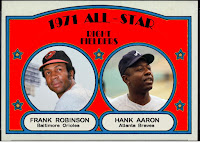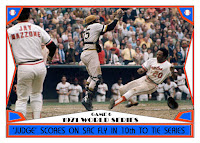1969 was the last season in which the AFL and NFL were separate leagues. There was, however, yet another Rookie of the Year presenter. This time it was Pro Football Weekly/Pro Football Writers of America (PFW). Like the AP, they presented the award to both offensive ROY and defensive ROY.
Fortunately, there was little difference among the ROY award recipients. Both the AP and PFW awards went to Calvin Hill on offense and "Mean" Joe Greene on defense. The NEA award went to Calvin Hill. Hill was the unanimous choice by TSN and UPI for the NFL. In the AFL they split with TSN awarding it to Carl Garrett. The UPI award went to Greg Cook.
Calvin Hill and Greg Cook would wait until 1970 to appear on a Topps card. Green and Garrett wouldn't show up in a Topps set until 1971.
 Starting with the unanimous choice, Calvin Hill was the Cowboys' first round pick in the 1969 draft. The halfback from Yale was the first Ivy Leaguer ever picked in the first round. In his first 9 games, Hill led the league in rushing with 807 yards. In the ninth game he set a Cowboys record with 150 yards. He also broke his toe and totaled just 135 yards over the remaining games.
Starting with the unanimous choice, Calvin Hill was the Cowboys' first round pick in the 1969 draft. The halfback from Yale was the first Ivy Leaguer ever picked in the first round. In his first 9 games, Hill led the league in rushing with 807 yards. In the ninth game he set a Cowboys record with 150 yards. He also broke his toe and totaled just 135 yards over the remaining games.
He played for the Cowboys from 1969-1974. In 1975 he played for the Honolulu Hawaiians of the WFL. After that league went bust he returned to the NFL from 1976-1981 playing in Washington and Cleveland.
 The defensive ROY was future Hall of Famer, "Mean" Joe Greene. Greene was the 4th overall pick of the 1969 draft. He played college ball for the North Texas Mean Green. North Texas changed its nickname from the Eagles to Mean Green while Mean Joe Greene was playing there. But the cross-over nicknames are reportedly coincidental. See here.
The defensive ROY was future Hall of Famer, "Mean" Joe Greene. Greene was the 4th overall pick of the 1969 draft. He played college ball for the North Texas Mean Green. North Texas changed its nickname from the Eagles to Mean Green while Mean Joe Greene was playing there. But the cross-over nicknames are reportedly coincidental. See here.  Playing at the University of Cincinnati, he was chosen by the Cincinnati Bengals with the 5th overall pick. He led them to a 3-0 record as a starter before sustaining a shoulder injury. He missed 3 games and parts of 2 others. He continued to play through the pain, starting games 8-14. But he had done permanent damage. Three surgeries later he made an unsuccessful comeback attempt in 1973 as Ken Anderson's backup.
Playing at the University of Cincinnati, he was chosen by the Cincinnati Bengals with the 5th overall pick. He led them to a 3-0 record as a starter before sustaining a shoulder injury. He missed 3 games and parts of 2 others. He continued to play through the pain, starting games 8-14. But he had done permanent damage. Three surgeries later he made an unsuccessful comeback attempt in 1973 as Ken Anderson's backup.
Cook was a one-season-wonder in 1969. He was named AFL Rookie of the Year by UPI. He threw 3 passes in 1973 completing only one for 11 yards. I was asked to make this card for another blog quite a few years ago. "Jim From Downingtown" requested this for his 1968 Football Cards blog.
 The Sporting News awarded their AFL Rookie of the Year to Carl Garrett. Garrett was an all-purpose back. He rushed, caught passes, and returned punts and kicks. He put up an impressive 1909 all purpose yards in 1969. His numbers fell dramatically in 1970 particularly in the backfield. After the 1970 season he was traded to Dallas for Duane Thomas. After Thomas refused to take a physical exam for the Patriots, the trade was voided. Garrret played from 1969-1972 in New England. He played pro ball from 1973-1977 for the Bears, Jets and Raiders.
The Sporting News awarded their AFL Rookie of the Year to Carl Garrett. Garrett was an all-purpose back. He rushed, caught passes, and returned punts and kicks. He put up an impressive 1909 all purpose yards in 1969. His numbers fell dramatically in 1970 particularly in the backfield. After the 1970 season he was traded to Dallas for Duane Thomas. After Thomas refused to take a physical exam for the Patriots, the trade was voided. Garrret played from 1969-1972 in New England. He played pro ball from 1973-1977 for the Bears, Jets and Raiders.




















































